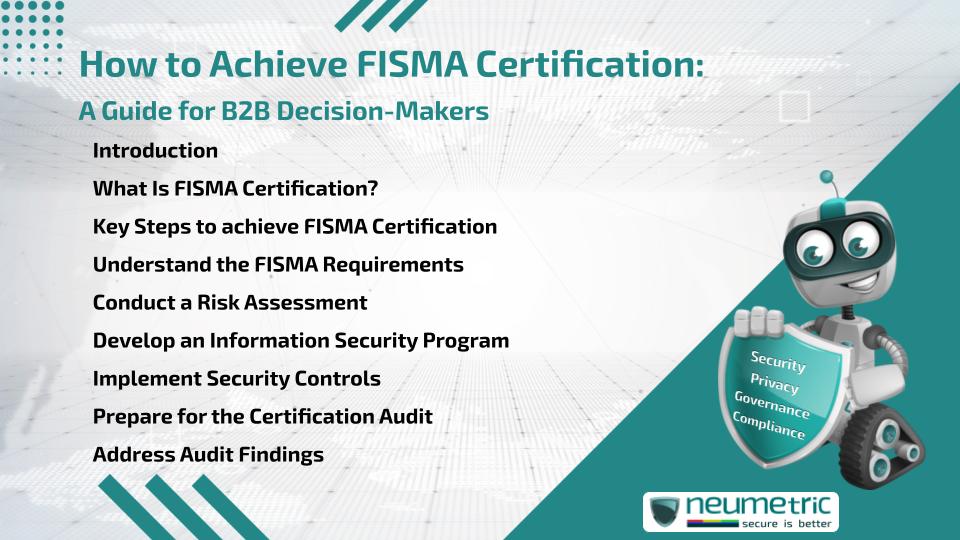Table of Contents
ToggleIntroduction
The Federal Information Security Management Act [FISMA] is a key legislation in the United States that requires Federal Agencies & their Contractors to secure Sensitive Information. FISMA Certification ensures that an Organisation follows rigorous Cybersecurity Standards, which helps protect Data from Cyber Threats. For Businesses aiming to serve the Federal Government or handle Government Data, achieving FISMA Certification is not just a Legal Requirement but also a competitive advantage. This guide will walk B2B decision-makers through the process of how to achieve FISMA Certification, highlighting key steps, challenges & best practices.
What Is FISMA Certification?
FISMA was enacted in 2002 as part of the E-Government Act to promote secure Information Systems within Federal Agencies. The Act mandates that Agencies develop, document & implement an Information Security Program. Achieving FISMA Certification involves meeting the Security Requirements set by the National Institute of Standards & Technology [NIST], which produces a series of guidelines known as the NIST Cybersecurity Framework.
For Businesses seeking FISMA Certification, the process can seem daunting. However, understanding the standards & how to meet them is the first step toward Compliance. FISMA Certification is an ongoing process, requiring Continuous Monitoring, Evaluation & improvement of Security Practices.
Key Steps to achieve FISMA Certification
Understand the FISMA Requirements
Before starting the Certification process, it is essential to fully understand the FISMA Requirements. The Main Standards to follow are set out in NIST’s Special Publication [SP] 800-53, which outlines Security & Privacy Controls for Federal Information Systems. The Controls are divided into families such as Access Control, Incident Response & System & Communications Protection. A good starting point is reviewing these Controls to understand the depth of security measures needed.
Conduct a Risk Assessment
The next step is Conducting a Risk Assessment to identify potential Vulnerabilities within your Systems. The Risk Assessment helps determine the security needs based on the sensitivity & impact of the information being processed. By evaluating Risks, you can prioritise which security measures should be implemented to protect Data effectively. This stage is critical because it forms the foundation for your Security Plan.
Develop an Information Security Program
Once you have identified the Risks, you need to create an Information Security Program that outlines how to mitigate those Risks. The Program should include Policies & Procedures that follow NIST Guidelines, focusing on aspects like Incident Response, Disaster Recovery & Employee Training. A well-structured Information Security Program will demonstrate your Organisation’s commitment to maintaining a Secure System.
Implement Security Controls
Security Controls are Technical & Administrative safeguards designed to protect Data & Systems. NIST provides specific Controls under various categories, including Access Control, Encryption & System Integrity. To achieve FISMA Certification, Businesses must implement these Controls & ensure they are regularly tested & updated. Automation tools can help streamline this process & ensure that Security Controls are functioning as intended.
Prepare for the Certification Audit
Once your Organisation has implemented Security Controls, it is time to prepare for the Certification Audit. This Audit, conducted by an Accredited Third-Party, will assess whether your Organisation’s Information Security Practices align with FISMA standards. The Audit will examine the effectiveness of your Security Controls, Risk Management practices & Compliance with NIST Guidelines. Ensuring that all Documents & Procedures are in order is essential for passing this Audit.
Address Audit Findings
If the Audit uncovers any Gaps or Weaknesses in your Security Program, you will need to address them before achieving FISMA Certification. This may involve additional improvements to Security Measures, Documentation or Staff Training. While it is ideal to address all findings before the Audit, addressing them Post-audit can still lead to a successful Certification.
Continuous Monitoring & Reporting
FISMA Certification is not a one-time event but an ongoing process. Once certified, Organisations must continuously monitor & assess their systems to ensure they remain compliant with FISMA Standards. Regular Security Audits & Reporting are necessary to maintain certification & address any evolving Security Threats.
Practical Tips for achieving FISMA Certification
Start early & Plan ahead
Achieving FISMA Certification requires significant time & effort, particularly for Businesses new to the process. Start early & plan your resources accordingly. Involve Key Stakeholders from IT, Legal & Operations Teams early in the process to ensure a smooth journey toward Certification.
Use Automation Tools
Automation Tools can help streamline the process of implementing Security Controls & Monitoring System Performance. Tools that automate Vulnerability Scans, Patch Management & Compliance Reporting can reduce the burden of manual monitoring.
Invest in Employee Training
Your Employees play a critical role in maintaining Information Security. Regular training on Security Best Practices, Incident Reporting & Compliance Guidelines is essential for maintaining a Secure Environment.
Consider Third-Party Support
The Certification process can be complex, so you may want to consider enlisting Third-Party Experts or Consultants with experience in achieving FISMA Certification. These Professionals can provide valuable insights & help navigate the Certification process more effectively.
Limitations & Challenges
While FISMA Certification can enhance your Organisation’s credibility & open doors to Government Contracts, the process comes with challenges. One of the main difficulties is the Cost & Resource Investment required to implement Security Controls & conduct Risk Assessments. Additionally, the Certification process can take several months to complete, which may delay other Business Objectives. Finally, FISMA Certification requires Ongoing Compliance, meaning Businesses must commit to long-term efforts in Monitoring & improving Security Measures.
Conclusion
FISMA Certification is an important milestone for any Business looking to work with the Federal Government or handle Sensitive Government Data. It helps enhance the trustworthiness of your Organisation while safeguarding Critical Data. The Certification process may be time-consuming, but it offers significant benefits in terms of Security & Business Opportunities.
Takeaways
- Understand FISMA Requirements & NIST Standards.
- Conduct a thorough Risk Assessment.
- Develop a robust Information Security Program.
- Implement necessary Security Controls.
- Prepare for & undergo the Certification Audit.
- Address Audit Findings & continuously Monitor Systems for Compliance.
FAQ
What is the FISMA Certification process?
The FISMA Certification process involves understanding NIST Security Standards, conducting a Risk Assessment, developing a Security Program, implementing Controls & passing a Third-Party Audit.
Why is FISMA Certification important?
FISMA Certification ensures that Organisations follow strict Security Measures to protect Sensitive Data, which is particularly important for Businesses working with the Federal Government.
How long does it take to achieve FISMA Certification?
Achieving FISMA Certification can take several months, depending on the complexity of your Organisation’s Systems & the Resources available for the Certification process.
Can Small Businesses achieve FISMA Certification?
Yes, Small Businesses can achieve FISMA Certification. While the process may be more resource-intensive, it is achievable with proper planning & the use of automation tools.
What are the main challenges in achieving FISMA Certification?
The main challenges include the cost of implementation, the time required for the Audit & the ongoing effort to maintain Compliance through Continuous Monitoring.
How often do I need to renew FISMA Certification?
FISMA Certification needs to be renewed annually through Continuous Monitoring & periodic Audits to ensure ongoing Compliance.





